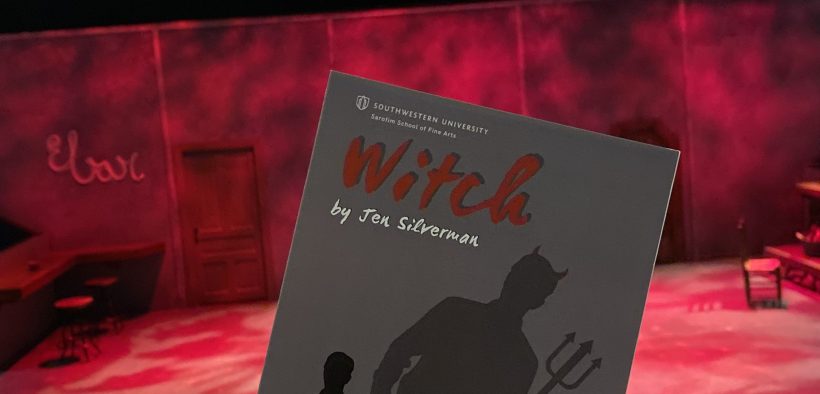The Witch: The Reality of a Made Up World
Share

As a devout Christian who interns at a local church, I was a little apprehensive about going to watch Southwestern Theatre’s most recent production. The play, titled The Witch, features the devil as its main character. I went into the FAB mentally prepared for jabs towards my faith. I didn’t really know what to expect going into the show–I had never even heard of it before. But I imagined the plot line to be a perplexing attempt at abstract theater. I did not, however, in a million years, expect to resonate so deeply with the devil–Scratch in this case. Nor did I anticipate a show occupying a made up world and time to feel so gut-wrenchingly real.
For the show, Southwestern students created a world outside the realms of known space or time. The play portrays an intermingling of humanity’s stained past, current political stage, and glimmers of a hopeful future.The inhabitants of this eccentric reality are: Scratch, the devil (played by Katherine Lunum, junior), The Witch, Elizabeth Sawyer (reimagined by Faith Madsen, junior), Sir Arthur Banks, a glamorous elite played by Devonte Rogers (senior), Cuddy Banks: Arthur’s misfit son skillfully embodied by Maisie Jones (junior), Winnifred (the dejected castle servant, played by Abigail Bensman, sophomore) and Frank Thorny (an adoptive heir, played by the talented and charismatic Will Malick, junior).
The show trails Scratch, a junior colleague heathen, through his every day work routine of buying souls. One by one the audience watches Scratch, the devil, land sales–and souls– left and right, without so much as breaking a sweat. However, his buying streak is broken when he comes across one difficult client who does not so readily accept his offer as others had.
Elizabeth Sawyer, the town outcast, is pegged as “The Witch” by unempathetic town’s people. Despite being dubbed as evil by the rest of the village, she is not eager to make deals with the devil. Elizabeth rejects Scratch’s initial sales pitches, which leads to the two spending copious amounts of time together. Whether Elizabeth ends up selling her soul or not— I’ll leave a mystery. However, the ease and enthusiasm in which the rest of Scratch’s clients sold him their souls made me ponder the question, “What do I prize higher than my own soul?”
As the show continued, this question continued to pop up in my mind. The story unfolds, showing Winnifred as a victim to a toxic relationship. You may ask, with whom? Well… you’ll have to watch to find out! Rejected, cast aside, heart broken, and overlooked, Winnifred pitifully stumbles through a monologue about what she desires in exchange for her soul. Throughout her rambling, she states one depressing wish: to be buried close enough to her ex lover that the bees from the wildflowers planted next to his grave can come to hers too.
After that soul crushing line–pun not intended–I couldn’t help but think: “Your soul is worth so much more than that! You are selling yourself for too little.” Then I realized, I already sell my worth for much less. I resonated far too closely with Winnifred’s love-hungry, despondent desires. When Elizabeth, an up-and-coming expert on the devil’s sales pitches, challenged her to sell her soul for something of higher worth, Winnifred angrily resolved that trying to get more out of life is pointless, because nothing improves or changes. One can change their circumstances and alter their societal status, but their fate still follows them; and Destiny was not kind to her
I physically felt my heartstrings begin to break after hearing that. It felt too real. I have a tendency to sell myself short and devalue myself. And much like Winnifred, I’ve felt like advocating for my own worth is a hopeless endeavor. When people continue to make you feel worthless, it’s hard to believe that any other conclusion could be true. This scene, one of the closing ones, made me realize that people are often willing to sell something as precious as their soul because their soul is not precious to them. It’s easy to sell yourself–your own life, being, and purpose–for something as materialistic as money or for something as unfulfilling as power when you believe that those things will give you a value you believe to be non-existent within yourself.
Southwestern’s theater department did an excellent job in bringing this show to life. Though initially apprehensive about seeing it, I was pleasantly surprised by how much I ended up enjoying it. This production about a witch and a devil caused me to reflect deeply about my own life and insecurities. The cast brought exquisite authenticity to their characters. I felt like I was watching real footage from Maisie Jones’ life, rather than a role she was simply playing. And I felt like I was listening to real thoughts from the heads’ of Faith Madsen and Abigail Bensman rather than rehearsed lines. The lights, costume, and set design skillfully worked in tandem with the cast to evoke raw and real themes. If you haven’t already, buy your tickets for this weekend’s shows at the FAB (hit this link for tickets). The Witch was truthfully a thematic masterpiece.
